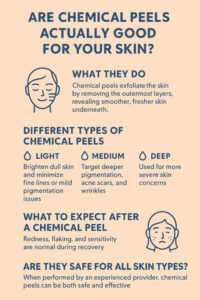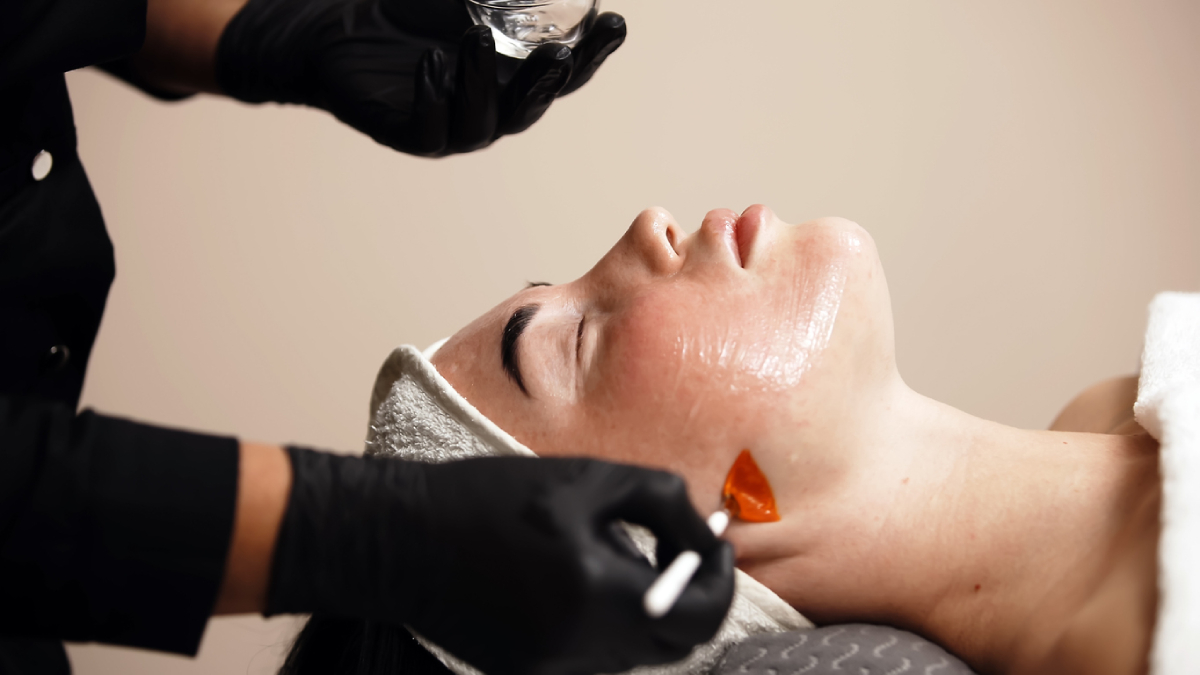Ever wish you could just hit “refresh” on your skin? That’s exactly the kind of magic chemical peels have been promising for years, and we can see why! From smoothing out fine lines to brightening dull complexions, they’ve earned a loyal following from skincare pros, celebs, and glowing everyday faces alike.
But with so many skincare treatments crowding the shelves and trending online, it’s only fair to ask: Are chemical peels actually good for your skin?
Whether you’re a seasoned skincare lover or just dipping your toes into the world of peels, we’re breaking it all down: what they do, why they work, and if this glow-up treatment could be the perfect match for your skin goals. Let’s peel back the layers (pun totally intended) and dive in.
Are Chemical Peels Actually Good for Your Skin?
Chemical peels are designed to exfoliate the skin by removing the outermost layers, revealing smoother, fresher skin underneath. They can target a wide range of concerns, such as fine lines, acne scars, dark spots, sun damage, and uneven texture. The results that follow range from subtle to dramatic, depending on the depth of the peel and the desired outcome.
So, the short answer is yes. When performed by a qualified professional, chemical peels are very good for your skin. They stimulate collagen production, enhance cell turnover, and promote the skin’s natural renewal process. With consistent care and the right treatment plan, peels can even help you achieve long-term skin health and a more youthful glow.
However, not all peels are the same. The key to their effectiveness lies in customization and expert application. At a practice such as that of Dr. Sohrab, which specializes in oculofacial plastic surgery and aesthetic procedures, peels are selected based on your unique skin type and goals, guaranteeing both safety and visible results.
Different Types of Chemical Peels and What They Do

Not all peels work the same way, and the right choice depends on your specific skin concerns. Generally, chemical peels are categorized as light, medium, or deep
- Light peels (such as glycolic or lactic acid) are great for gentle exfoliation. They can brighten dull skin and minimize fine lines or mild pigmentation issues.
- Medium peels (like trichloroacetic acid or TCA) target deeper pigmentation, acne scars, and wrinkles.
- Deep peels (such as phenol peels) are much stronger and used for more severe skin concerns, including deep wrinkles and extensive sun damage.
Each level of peel comes with its own downtime and healing process. A professional consultation is essential to determine which peel is best suited to your skin’s condition and desired outcome.
What to Expect After a Chemical Peel
A common concern for many first-timers is what happens after the peel. While recovery depends on the type of peel, some redness, flaking, and sensitivity are completely normal. Lighter peels typically require minimal downtime, while deeper peels may involve a few days of peeling and post-treatment care.
This process is actually a good sign! It means your skin is shedding damaged cells and regenerating new ones. Once the peeling phase passes, many patients notice visibly smoother skin with improved tone and clarity.
It’s important to follow your provider’s aftercare instructions closely. Avoid sun exposure, keep skin moisturized, and use gentle cleansers. This will help your skin heal faster and allow you to enjoy the full benefits of your peel.
Are Chemical Peels Safe for All Skin Types?
This is where expert guidance really matters. While chemical peels are safe for many people, those with darker skin tones, sensitive skin, or certain medical conditions may need a more tailored approach to avoid unwanted side effects like hyperpigmentation.
An experienced oculofacial plastic surgeon or aesthetic provider, such as Dr. Mahsa Sohrab, can assess your skin type and select the most suitable peel formulation. When performed under the care of a skilled professional, chemical peels can be a safe and effective option for nearly all skin tones and types.
So, Are Chemical Peels Worth It?
If you’re looking for a treatment that can dramatically improve skin texture, tone, and brightness with little to no downtime, chemical peels are absolutely worth considering. When applied professionally and carefully chosen, they can transform your skin from the inside out, helping you look refreshed, radiant, and confident.
At Sohrab Facial Plastic Surgery, every chemical peel is customized to your unique skin goals. You’ll get expert recommendations, medical-grade ingredients, and the peace of mind that comes from working with a board-certified specialist.
Ready to Reveal Healthier Skin?
Schedule your consultation today to explore customized chemical peel treatments from expert oculofacial plastic surgeon Dr. Sohrab and discover just how radiant your skin can be.
